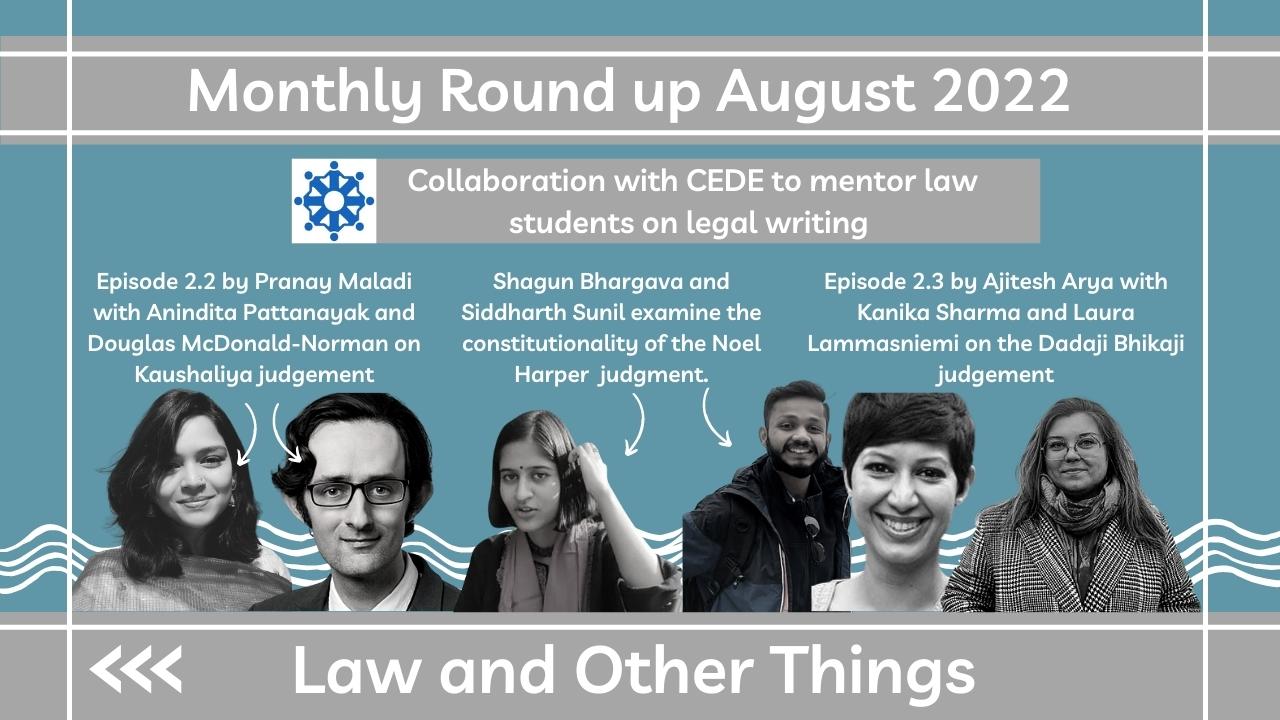Happy New Year folks! Law and Other Things published a range of interesting articles and new scholarship discussions to further scholarship in public law. Below we bring you an update on the Blog’s activities during January 2022.
Blog Posts
Aaya Ram Gaya Ram is a phrase in Indian politics that emerged in 1967, when Haryana MLA Gaya Lal changed his party thrice within the same day. The anti defection law that then emerged sought to prevent such situations in the future, where one might defect due to the lure of an office or similar incentives. There are, however, circumstances where legislators may shift to a different party without risking disqualification, and that is the Merger Exemption. Analyst Shantan Reddy has authored a two part post on “Merger Exception to Defection”. Part I introduces defection law to the readers and explains how the merger exception has been misused to facilitate illegal defection. Part II specifically looks into the examples of Telangana and Goa to argue how the merger exception is being misused in state level politics.
Ishika Garg and Yash Dodani have written a piece on “A Substantive Equality Guide to Making Judicial Spaces Accessible to Persons with Disabilities”. They argue that there is a constitutional duty on the judiciary to ensure that judicial spaces are accessible to those with disabilities, furthering the spirit of substantive equality, and suggest steps in this direction.
Analyst Mrityunjoy Roy has written about the Gauatam Navlakha case and Sudha Bharadwaj case in the context of including house arrest under the meaning of judicial custody under section 167 of Criminal Procedure Code, and its implications. He concludes that though a landmark move which expands the conception of “custody” under Indian law, the idea is still too abstract and leaves a lot of questions and practicalities around the issue unanswered, and cautions that house arrest risks becoming a development only on paper reserved for the privileged few, instead of genuine progress for criminal law.
Kartik Shrivastava writes about the government’s reluctance to conduct a caste census and argues that there is a pressing need to conduct the same. [Increasing Diversity by Increasing Access to Legal Education (IDIA), Hyderabad Chapter, had partnered with Law and Other Things to organise an Essay Writing Competition. This piece, titled “Caste of Votes: Need for a Caste Census?”, was the winning entry selected by IDIA]. The Oxford South Asian Alternative Forum is organising a conference on the need and implications of conducting a caste census in India.
New Scholarship
The Courts and the Constitution – 2020 & 2021 in Review: Call for Proposals
Law and Other Things, in association with NALSAR University of Law and Azim Premji University, is organising ‘The Courts and the Constitution – 2020 & 2021 in Review’ conference in March, 2022. In addition to the invited speakers, proposals for presentations by students, researchers and professionals who are below 30 years of age are invited.
This year, LAOT is inviting submissions from authors on the themes of each panel. They are:
- The State of the Judiciary
- Public Health Crisis and the Constitution
- Emerging Voices – The Shamnad Basheer Memorial Roundtable
- Contemporary Issues in Indian Federalism
- Environmentalism and Governance in South Asia
- Civil Liberties and Criminal Justice
More details about each panel can be found in the attached concept note here. Please fill this google form to apply and submit manuscripts by 25 February 2022. The detailed Call for Proposals can be found here.
We concluded our discussions on Sneha Banerjee and Prabha Kotiswaran’s Divine labours, devalued work: the continuing saga of India’s surrogacy regulation which was published in volume 5 of the Indian Law Review. A summary of the piece can be found here. Sharmila Rudrappa responded to the arguments of Sneha Banerjee and Prabha Kotiswaran, arguing that the authors could have “deepened their feminist critiques”. Further, she argues that the bill should consider the legal and social milieu within India, more so than drawing on comparative experiences, since “there is only so much that can be learned through a thorough examination of other nation-states’ surrogacy laws”. Finally, she notes that lack of a law on surrogacy in India, though undoubtedly a shortcoming, may not be completely bad in itself, given the prevailing anti-feminist thrust of the law (citing the recently litigated Texas anti-abortion law as an example).
In the second post of the month, the authors Sneha Banerjee and Prabha Kotiswaran responded to the discussants. They agree with the discussants (Swati Gola, Anindita Majumdar, Sharmila Rudrappa and Chayanika Shah) that it is imperative that the dissonances between the ART Bill and SRB be addressed, but note that such harmonisation has not been undertaken before the SRA has entered into force. They specifically address Shah’s argument of separately dealing with regulation of technology and its provisioning and regulations around people who can access the said technology, Majmudar’s argument highlighting the need to foreground an understanding of kinship and the idea of “kutumb” as a safe haven for gift-giving transactions, Rudrappa’s question of whether the concept of “compensated surrogacy” transforms the nature of the transaction in gestational surrogacy, especially when it is between “close relatives” (albeit undefined) from gift-giving to commodity form, and Gola’s argument of power imbalance in surrogacy contracts. Responding to Rudrappa’s question of whether non-regulation of surrogacy may be a net positive, the authors note that all social realities are regulated by law, and existing laws already determine bargaining powers between contracting parties in ways that disempower surrogates undertaking pregnancies for domestic commissioning parties.
For more updates, you can follow us on LinkedIn, Twitter or Instagram. Subscribe to our newsletter here.




[…] Posted byNitya Ravichandra and Maladi Pranay […]
Thanks for sharing. I read many of your blog posts, cool, your blog is very good.